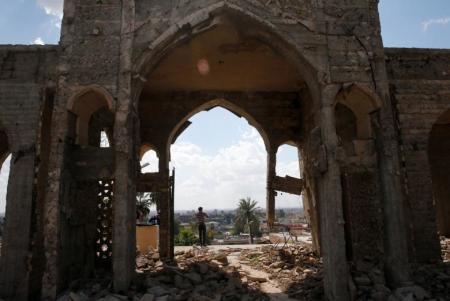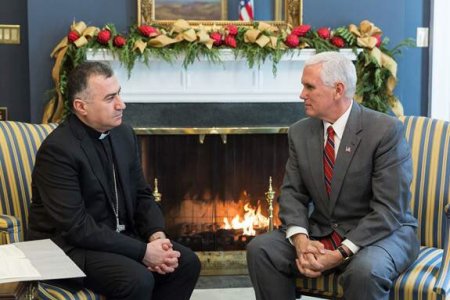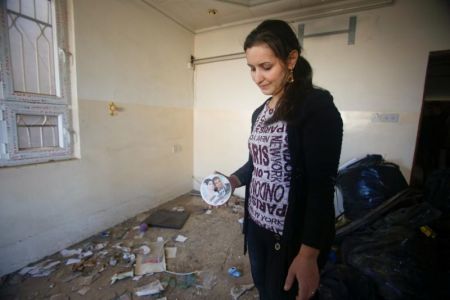Trump Designates $55 Million to Help Christians, Religious Minorities Rebuild in Iraq

In the wake of Vice President Mike Pence's announcement last October that the United States government would provide direct aid to persecuted Iraqi Christians struggling to rebuild following the liberation of the Nineveh Plains, the Trump administration has taken concrete steps to follow through on its promises.
Trump's administration announced that it has renegotiated an agreement with the U.N. to ensure that vulnerable Christians, Yazidis and other religious minorities victimized by the Islamic State in Iraq will get the U.N. assistance they were previously denied.
The administration has also announced that it's accepting proposals by private organizations on the ground in Iraq to receive direct assistance from the U.S. government to rebuild the ancestral homelands of Christians and other minorities destroyed by the jihadi death cult.
According to a press release sent out by the U.S. Agency for International Development, the agency has ensured that $55 million of its $75 million payment to the U.N. Development Program Funding Facility for Stabilization in Iraq "will address the needs of vulnerable religious and ethnic minority communities" in the Nineveh Province.
USAID has been granted more oversight to ensure that the U.N. funding marked for minorities is spent effectively.
"The modified agreement ensures that the U.S. contribution will help the populations of liberated areas in Ninewa Province resume normal lives by restoring services such as water, electricity, sewage, health, and education," the release explains.
The $75 million payment is the first portion of a $150 million allotment designated for FFS, which was announced by U.S. Ambassador to Iraq Douglas Silliman last July. According to USAID, "fulfillment of the rest of that pledge will depend on UNDP's success in putting in place additional accountability, transparency, and due-diligence measures for the FFS."

Iraqi Christian leaders and human rights activists have raised numerous complaints about how thousands of persecuted and displaced minorities were not receiving their fair share United Nations assistance for community rebuilding efforts.
In his announcement of direct U.S. assistance for Iraqi religious minorities last year, Pence slammed the U.N. for the fact that Christians in the Nineveh Plains have had "less than 2 percent of their housing needs addressed and the majority of Christians and Yazidis remain in shelters."
Given the UNDP's history, at least one prominent human rights expert remains wary despite the administration's announcement.
"I have no confidence in the UNDP," Hudson Institute senior fellow Nina Shea, a former commissioner on the U.S. Commission on International Religious Freedom, told The Christian Post in an email Friday. "As USAID is now willing to admit, UNDP has been grossly mismanaged, is not transparent, and has deliberately marginalized the genocide that targeted Christian and Yazidi minorities for over the past two years."
According to Shea, the success of the new agreement "will depend on the vigilance of USAID overseers."
"The funds will have to be closely monitored, not just on paper, but in field checks and through regular input from church leaders on the ground," Shea asserted.
Philippe Nassif, the executive director of the human rights lobbying group In Defense of Christians, told CP in a statement that his organization is "confident" that the Trump administration will "keep a close watch" on how UNDP is allocating the money the U.S. has given to help religious minorities rebuild their lives.
"The United States government understands the dire situation these communities are currently in following the genocide committed by ISIS, and are focused on ensuring that money sent to UNDP gets to those that need it most, particularly to Christians and Yezidis in Iraq," Nassif assured.
USAID Counselor Tom Staal told Fox News that new oversight procedures have been put in place between USAID and UNDP.
Some of the measures include access for a U.S. inspector to UNDPs books and the hiring of a "third party" to perform oversight on UNDP's work. Additionally, the new agreement between the two agencies lays out the specific towns that the $55 million allotted for religious minorities are to be spent.
USAID is also fulfilling Pence's vow that the U.S. will directly provide funding to organizations on the ground that are directly helping Christians and religious minorities rebuild their ancestral homelands.
USAID has begun its own process of allowing NGOs to apply for direct assistance to help rebuild religious minority communities through a process called the "Broad Agency Announcement." The "competition" is tailored to "solicit innovative ideas that support the resettlement of ethnic and religious minorities in their ancestral homes in Iraq."

USAID plans to make decisions about the funding by early spring. According to Fox News, USAID has set aside $35 million for the proposals.
"Hope is running high," Andrew Walther, vice president of communications and strategic planning at the Catholic fraternal organization Knights of Columbus, which has donated millions to help Christians resettling and living displaced in Iraq, told the news outlet.
"I was just told by a representative of the Christian community in Iraq that the money being directed to them by the U.S. government, both directly and through the U.N., is the most positive American action on behalf of their communities since 2003."
Fox News reports that USAID's new terms with the UNDP were negotiated largely by U.S. Ambassador to the U.N. Nikki Haley and her office.
"We are very confident that not only will U.S. funds go more directly toward assisting persecuted religious minorities — the U.N. is also stepping up to the plate to further fund effective programs that directly go to communities — particularly in Iraq," a White House official told Fox News, adding that Pence's office is satisfied that the vice president's vows are being fulfilled.





















